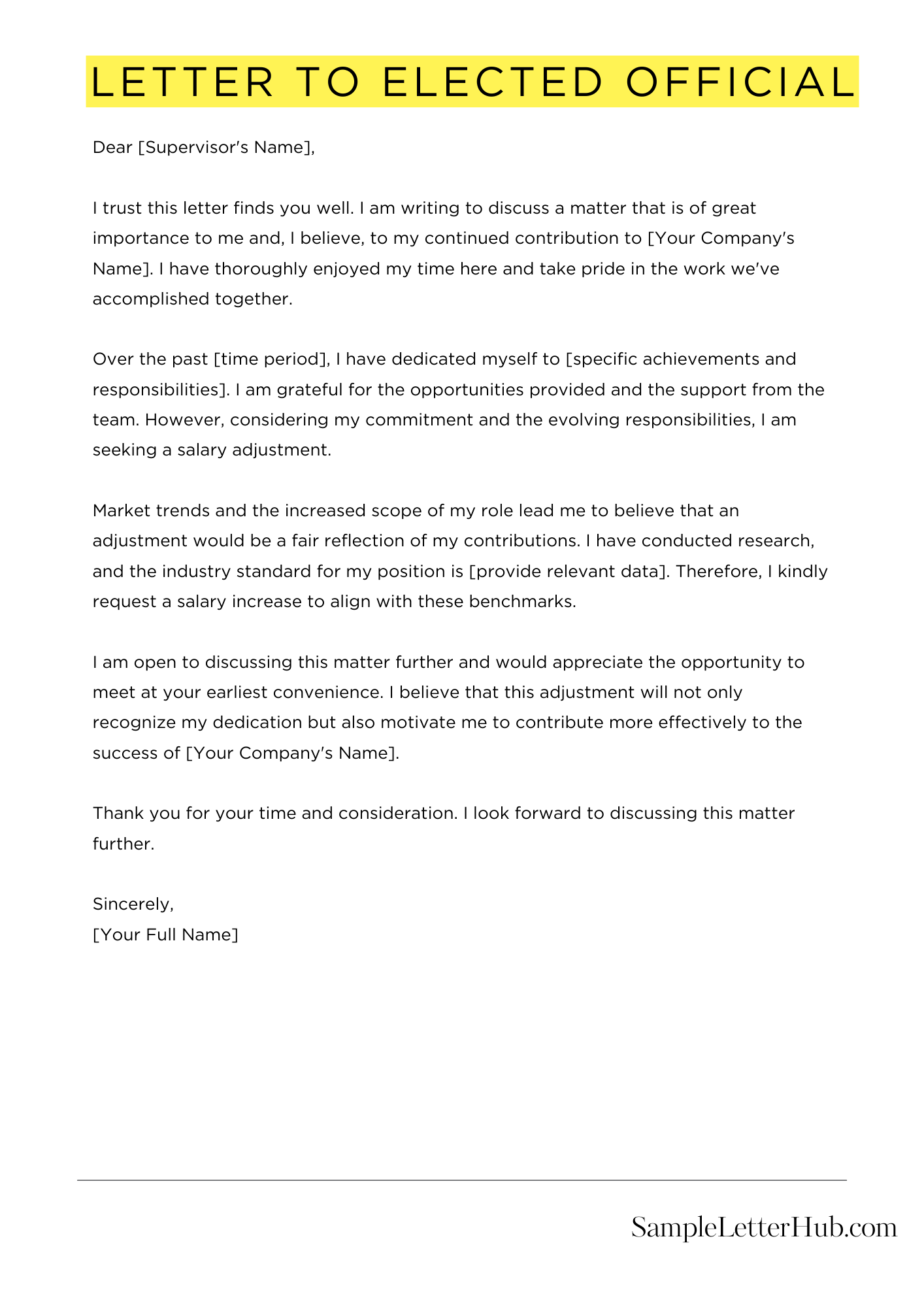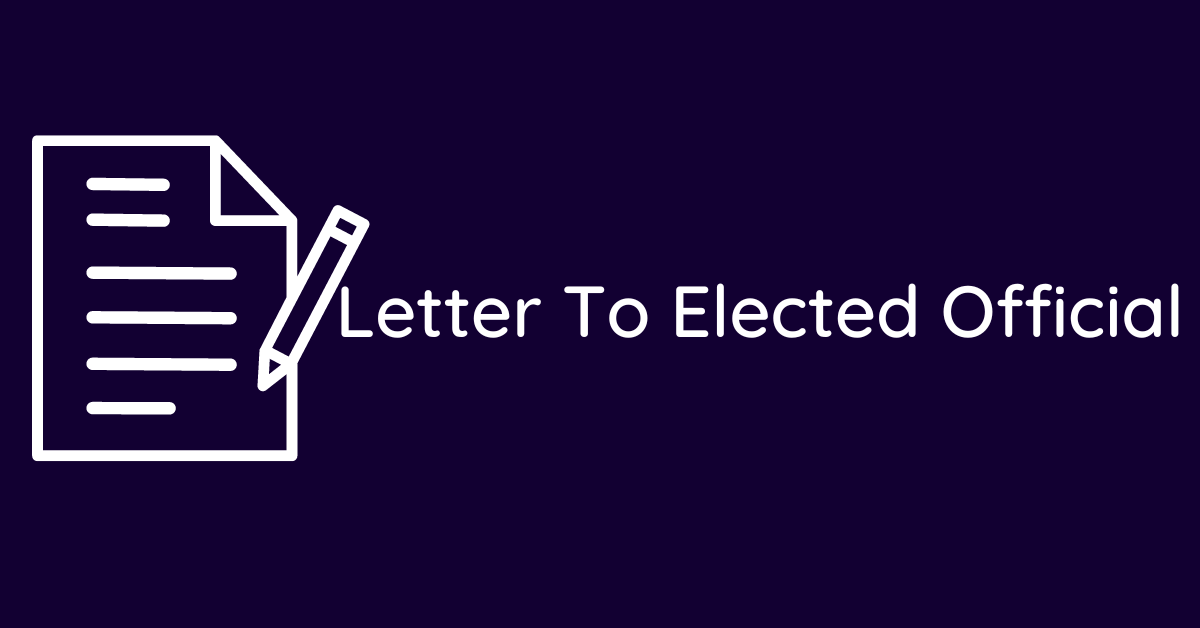Are you looking to make your voice heard by your elected officials? A letter to your elected official is a powerful tool that can help you express your concerns, opinions, and ideas.
It is a formal way to communicate with your representatives and make them aware of the issues that matter to you.
In this blog article, we will provide you with templates, examples, and samples of letters to elected officials. These resources will help you write a letter that is clear, concise, and effective.
Whether you are writing to your local council member, state representative, or federal senator, we have got you covered.
Our goal is to make it easy for you to write a letter that will get noticed by your elected officials.
We understand that writing a letter can be intimidating, but with our templates and examples, you will have a starting point that you can customize to fit your specific needs. So, let’s get started and make your voice heard!
Letter To Elected Official
Dear Honorable [Official’s Last Name],
I hope this letter finds you in good health and high spirits. I am writing to express my concerns and bring attention to [briefly describe the issue or topic you want to discuss]. As a dedicated member of our community, I believe it is crucial for our elected representatives to be aware of the challenges and opportunities that impact our daily lives.
[Provide additional information or background on the issue. Share personal experiences or anecdotes that highlight the importance of the matter.]
I kindly request your support and advocacy in addressing [specific actions or solutions you propose]. By working together, we can contribute to positive change and improve the well-being of our community members.
Thank you for your time and attention to this matter. I appreciate your dedication to public service and look forward to hearing about your efforts in making a difference for our community.
Sincerely,
[Your Full Name]
Letter To State Representative
Dear Honorable [Representative’s Last Name],
I trust this letter finds you well. I am writing to bring attention to a matter of great importance that affects our community and requires your support and advocacy. The issue at hand is [briefly describe the issue or topic you want to discuss], and it has significant implications for the well-being of our constituents.
[Provide additional information or background on the issue. Share statistics, testimonials, or any relevant data that can help illustrate the urgency of the matter.]
I kindly request your assistance in championing [specific actions or initiatives you propose] that will contribute to the resolution of this matter. Your leadership and dedication to the well-being of our community make you an invaluable advocate for positive change.
Thank you for your time and consideration of this important issue. I am confident that your efforts will make a lasting impact, and I look forward to witnessing positive developments in our community.
Sincerely,
[Your Full Name]
Letters To Government Officials
Dear Honorable [Official’s Last Name],
I hope this letter finds you well. I am writing to express my concern and bring attention to an issue that deeply impacts our community. The matter at hand is [briefly describe the issue or topic you want to discuss], and it requires urgent consideration to ensure the well-being of our constituents.
[Provide additional information or background on the issue. Share facts, figures, or personal stories to illustrate the significance of the matter.]
I kindly request your support and advocacy in addressing this matter effectively. Your dedication to public service and commitment to our community make you a vital advocate for positive change.
Thank you for your time and consideration. I am confident that your leadership will contribute to the betterment of our community, and I look forward to witnessing positive outcomes.
Sincerely,
[Your Full Name]
Sample Letter To Elected Official
Dear Honorable [Official’s Last Name],
I trust this letter finds you well. I am writing to bring to your attention a matter of great importance that affects the constituents of our community. The issue at hand is [briefly describe the issue or topic you want to discuss], and it requires your thoughtful consideration and action.
[Provide additional information or background on the issue. Share facts, figures, or personal stories to illustrate the significance of the matter.]
Your leadership and dedication to public service make you a valued representative, and I believe that your advocacy can contribute significantly to resolving this concern.
Thank you for your time and commitment to serving our community. I look forward to your support in addressing this matter and ensuring a positive outcome for all.
Sincerely,
[Your Full Name]
Student Letter To An Elected Official
Dear Honorable [Official’s Last Name],
I hope this letter finds you in good health and high spirits. My name is [Your Full Name], and I am a student at [Your School Name]. I am writing to you today to express my concerns about [specific issue or concern] that deeply affects our community, including students like me.
[Share personal experiences or stories related to the issue. Explain why it is important to you and your fellow students. Include any relevant facts or statistics.]
As a student, I believe in the power of positive change, and I am reaching out to you with the hope that you can represent our voices in advocating for solutions to this matter. Your leadership is crucial, and your support can make a meaningful difference in our community.
Thank you for your time and commitment to public service. I trust that you will consider our concerns with the utmost attention they deserve.
Sincerely,
[Your Full Name]

How to Write a Letter to Your Elected Official
Writing a letter to your elected official can be a powerful way to make your voice heard. Whether you’re concerned about a particular issue or want to express your support for a policy, a well-crafted letter can help you get your message across. Here are some tips for writing an effective letter to your elected official.
1. Do Your Research
Before you start writing, it’s important to do your research. Find out who your elected official is and what their position is on the issue you’re concerned about. You can usually find this information on their website or by calling their office. This will help you tailor your letter to their specific interests and concerns.
2. Be Clear and Concise
When writing your letter, be clear and concise. State your position clearly and provide specific examples to support your argument. Avoid using jargon or technical terms that your elected official may not understand. Keep your letter to one page if possible, and use short paragraphs and bullet points to make it easy to read.
3. Use a Professional Tone
When writing to your elected official, it’s important to use a professional tone. Avoid using emotional language or attacking their character. Instead, focus on the issue at hand and provide evidence to support your position. Remember, your goal is to persuade your elected official, not to alienate them.
4. Provide Solutions
In addition to stating your position, it’s important to provide solutions. Offer specific suggestions for how your elected official can address the issue you’re concerned about. This will show that you’re not just complaining, but that you’re willing to work with them to find a solution.
5. Follow Up
After you’ve sent your letter, follow up with your elected official. Call their office to make sure they received your letter, and ask if they have any questions or concerns. This will show that you’re committed to the issue and that you’re willing to work with them to find a solution.
6. Be Respectful
When communicating with your elected official, it’s important to be respectful. Remember, they are busy people who are dealing with a lot of different issues. Be patient and understanding, and don’t expect an immediate response. If you don’t hear back from them, follow up again in a few weeks.
FAQs About Letter to Your Elected Official
1. What is the purpose of writing a letter to an elected official?
Answer: The purpose of writing a letter to an elected official is to express your concerns, opinions, and suggestions on issues that affect you and your community. It is a way to communicate with your elected representative and hold them accountable for their actions.
2. How do I find the contact information for my elected official?
Answer: You can find the contact information for your elected official by visiting their official website, calling their office, or using online directories such as VoteSmart.org or USA.gov.
3. What should I include in my letter to an elected official?
Answer: Your letter should include a clear and concise introduction, a brief explanation of the issue you are addressing, your personal experience or perspective on the issue, and a call to action or request for a response.
4. How should I format my letter to an elected official?
Answer: Your letter should be typed, using a professional font and formatting. It should be addressed to the elected official by name and include your full name and contact information.
5. How can I make my letter stand out to an elected official?
Answer: To make your letter stand out, you should personalize it by sharing your personal experience or perspective on the issue. You should also be respectful and concise in your writing, and provide specific examples or data to support your argument.
6. What should I do if I don’t receive a response from my elected official?
Answer: If you don’t receive a response from your elected official, you can follow up with a phone call or email. You can also reach out to their staff or attend a town hall meeting to address your concerns in person.
7. How can I stay informed about the issues my elected official is working on?
Answer: You can stay informed about the issues your elected official is working on by subscribing to their newsletter, following them on social media, attending town hall meetings, and reading local news sources.
Related:

